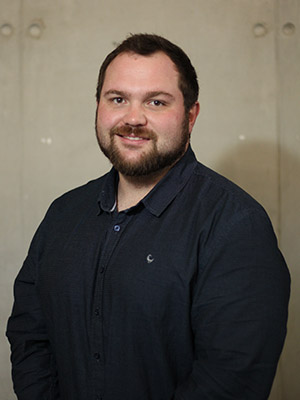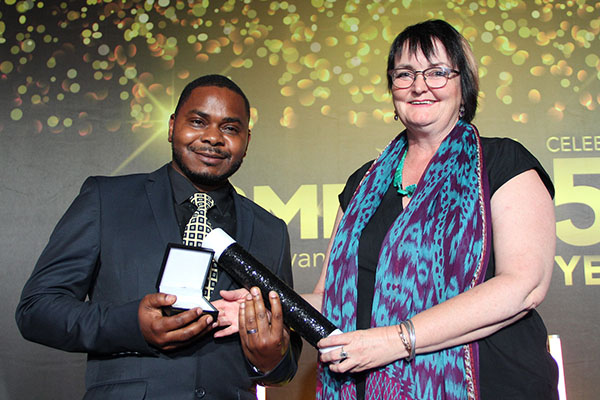Two scientists from Stellenbosch University's (SU) Faculty of Medicine and Health Sciences (FMHS) have been nominated for the prestigious 2018/2019 NSTF-South32 Awards which recognize outstanding contributions to science, engineering and technology and innovation in South Africa.
The awards recognize “Real South African science by South African scientists, getting awarded for their life-changing work!" The award ceremony takes place on June 27.
The scientists are Dr Wynand J. Goosen, a postdoctoral research fellow at the DST/NRF Centre for Excellence for Biomedical TB Research (who was nominated for the category: TW Kambule-NSTF Awards: Emerging Researcher) and Professor Novel Chegou, associate professor in the Division of Molecular Biology and Human Genetics (who was nominated for the category: TW Kambule-NSTF Awards: Researcher).
Dr Wynand J. Goosen
Goosen, 30, who was nominated in the category: TW Kambule-NSTF Awards: Emerging Researcher, has been conducting tuberculosis (TB) research among South African wildlife species from various endemic parks and hopes his work will later allow him to expand his research to communal cattle in rural areas as part of a One Health approach to combat TB.
“I am truly humbled by the nomination. I still haven't fully grasped the importance of it," said Goosen, who is passionate about both science and wildlife.
“Many people don't know that animals, including wildlife can get TB. The common form of animal TB is bovine TB. TB is a zoonotic disease meaning that it spreads between animals and people. Highlighting the importance of addressing TB on a global scale.
“As a South African, I love working with South African wildlife faced with South African disease problems. I believe this is the best opportunity to work towards a solution to our own problems in our own country. So, I am doing Proudly South African research!"
Goosen, who was born and raised in Grahamstown has been interested in wildlife since he was a child. “I grew up in the outdoors, visiting parks and game reserves, and hunting with my uncle."
After attending the PJ Oliver High School in Grahamstown, where he was head boy, valedictorian and first team rugby captain, Goosen completed an undergraduate BSc Molecular Biology and Biotechnology degree at Stellenbosch University between 2008 and 2011, and then went on to do a BSc Hons in Medical Science in 2012 at the FMHS.
“In 2012, I was the first student to join the Animal TB Research Group under the supervision of Prof Paul van Helden, the former executive head of the Department of Biomedical Sciences and Dr Sven Parsons, a veterinarian and scientist. The department focuses on TB research in humans but Professor Van Helden felt that it only made sense to investigate TB in all potential hosts in order to thoroughly address this global challenge. These include domestic animals like cattle, and wildlife like African buffaloes, African lions, African wild dogs, rhinoceros and African elephants. Today, we are a group of 10 students and we are doing unbelievably interesting research on TB in several game species," he said.
Goosen went on to do TB research in wild dogs all over South Africa, “from Hluhluwe to Kruger Park, mainly focusing on developing diagnostic tests for TB in wild dogs. He then signed up for a MSc degree in Medical Sciences with a focus on bovine TB in African buffaloes. “This was important since African buffaloes acts as a maintenance host of the disease responsible for spill-over infections to other wildlife, domestic animals and subsequently humans."
With a number of publications under his belt, Goosen was able to upgrade his MSc into a PhD.
During his PhD years, he continued his research in African buffaloes and graduated with his PhD in Molecular Biology in 2016, only four years after starting his MSc.
“It all started when I investigated a panel of TB-specific diagnostic markers in African buffalo whole blood plasma and made a number of interesting findings. One of these is the measurement of a biomarker called IP-10, which in combination with a conventionally used marker called IFN-γ, enable veterinarians to increase the sensitivity of a highly specific indirect blood-based test," said Goosen.
A postdoctoral research fellow since 2017, he is currently looking at evaluating direct DNA detection methods and enhancing ante-mortem mycobacterial culturing methods for diagnosing tuberculosis in African rhinoceros and elephants.
“The fact that we are detecting TB in our rhinos and elephants is cause for great concern … These species are already endangered and additionally to TB, faced with poaching. When TB is detected in wildlife, then that species is placed under quarantine with no translocation permitted. This complicates anti-poaching efforts and makes the country's rhinos sitting ducks for poachers.
“Together with the support from a large international diagnostic company called Cepheid, we are evaluating a rapid pathogen DNA diagnostic test to be used as a screening test to identify any suspect animals and provide the park of interest with the necessary information to make appropriate management decisions."
Passionate about his field of study, Goosen said, “I get to have a healthy balance between my desk, the laboratory and fieldwork in various wildlife parks. I get to places within all these parks most people will never have the opportunity to see. I get to experience all the incredible research that happens beyond all those 'no entry' signs in our country's beloved parks."
Asked about his long-term career goals, he responded: “As a child my sister always teased me, saying that I will one day make a living out of studying! She really didn't know how accurate her prediction was. I really am an academic at heart and I don't think I could be anything else. My long-term goal is to become an established, independent wildlife researcher who addresses animal and human TB problems on a global level."
Goosen said he is excited about the role that scientists play in the management of diseases in wildlife and plans to further his research on other animal species as well.
On his hopes to expand his research to communal cattle in rural areas, he said: “Many communal cattle from rural areas surrounding endemic parks are exposed to TB-infected wildlife at park borders without their owners realising, so there is a need for this research to not only determine how big of a problem this truly is, but also to create awareness about this in these areas."
Prof Novel Chegou
Prof Novel Chegou said he felt “greatly honoured" to be nominated for the 2018/2019 NSTF-South32 Awards. He was nominated for the category TW Kambule-NSTF Awards: Researcher.
“I feel really happy. As researchers, you do your work, not thinking you'll win something, so when I was nominated, and I found out that I was a finalist, it felt great."
Chegou's research focuses on the immunology of Mycobacterium tuberculosis infection. He is currently working on biomarkers for the diagnosis of tuberculosis disease, biomarkers of protective immunity against Mycobacterium tuberculosis, and biomarkers for monitoring of the response to tuberculosis treatment, amongst others. His particular interest is in the development of simple field-friendly point-of-care diagnostic tools for the rapid diagnosis of tuberculosis disease in resource-constrained settings, including diagnosis of the disease in adults and children.
He works on both pulmonary and extra pulmonary TB and currently leads the diagnostics subgroup of the SU Immunology Research Group.
Novel, who trained as a Medical Laboratory Scientist at the University of Buea, in his home country, Cameroon, moved to South Africa in 2004 and has, since 2005, been working on diagnostics for TB. “When I joined SU, the opportunity arose for me to focus on new immunological tests for our community. We realized the challenges involved in the diagnosis of TB disease and that the immunological tests that were being marketed as the solution were not useful in communities such as the ones that we work in. We then started asking questions on what we could do to develop tests that would be useful in high burden settings and poorly-resourced areas, like in many African countries.
“That led to more questions on whether we could modify the existing blood-based immunological tests (known by the acronym IGRA) to work in high burden settings. Our thinking then was that we could modify the tests such that we could still make use of their already standardized platform. That led us to the work we are doing, which is aimed at looking at biomarkers that can help in diagnosing TB disease and to monitor response to treatment."
Turning to the importance of these studies, Chegou said: “There are a lot of deficiencies in the current tools we use in diagnosing TB, especially in resource-depleted areas. The most advanced test in the TB market produces results in two hours but is not a test you can use at point of care, at the bedside or in a remote clinic which does not have electricity and good roads. If samples from a patient are tested with the gold standard test, which is culture, patients wait for a long time before the test yields results, sometimes up to 42 days.
“During that long waiting period, the patient continues to pass on the disease to other people. Many people come to the clinic and say they've been coughing for weeks. We collect samples, send them for tests to be done in a lab and then the nurse has to wait.
“If you have a test that gives results immediately – and which can tell you there is a very high chance the patient has TB, the healthcare provider can, convincingly tell the patient, 'you have a high probability of TB, so I will collect a sample to confirm this – and you can come back in two or three days when it is confirmed.' The patient leaves thinking they have to go back. It is very important that we have point of care tests. That is what we are working on.
“The tests we have been working on have the potential to give results in 30 minutes. These are not confirmatory tests, but just screening tests which enable a healthcare worker to indicate that there is a high chance the patient has TB or, alternatively, if the chances of TB are small. They can also then start providing alternative treatment, where needed, without making the patient wait for weeks.
“When we look at the studies we have been doing in six African countries, we have noticed that only about 30% of patients coming to the clinics who are strongly suspected of having TB, have the disease. That is why we think the kind of test we are developing will have a good impact. Apart from being faster, it will also lead to cost savings to both the patient and the healthcare system."
Turning to his long-term plans, Chegou, who was promoted to associate professor earlier this year, said he will continue working on the tests. “At the moment we are doing clinical trials to evaluate the use of these tests in five African countries including South Africa.
“I also focus on TB meningitis, a very severe form of TB which mostly occurs in children. Research done by other colleagues at SU has shown that on average, caregivers of children suffering from TB meningitis come to the clinic six times before eventual diagnosis of the disease, which is unacceptable.
“We are trying to develop a test that can help in diagnosing TB meningitis rapidly in those children. In the next couple of years I wish to refine those tests so that they become increasingly better at diagnosing adults and children. I will continue with studying tools to monitor responses to TB treatment and also do other work that will help us to understand the mechanisms at play in people suffering from TB."
Caption: Prof Novel Chegou and Dr Wynand Goosen.
Picture credit: Wilma Stassen

